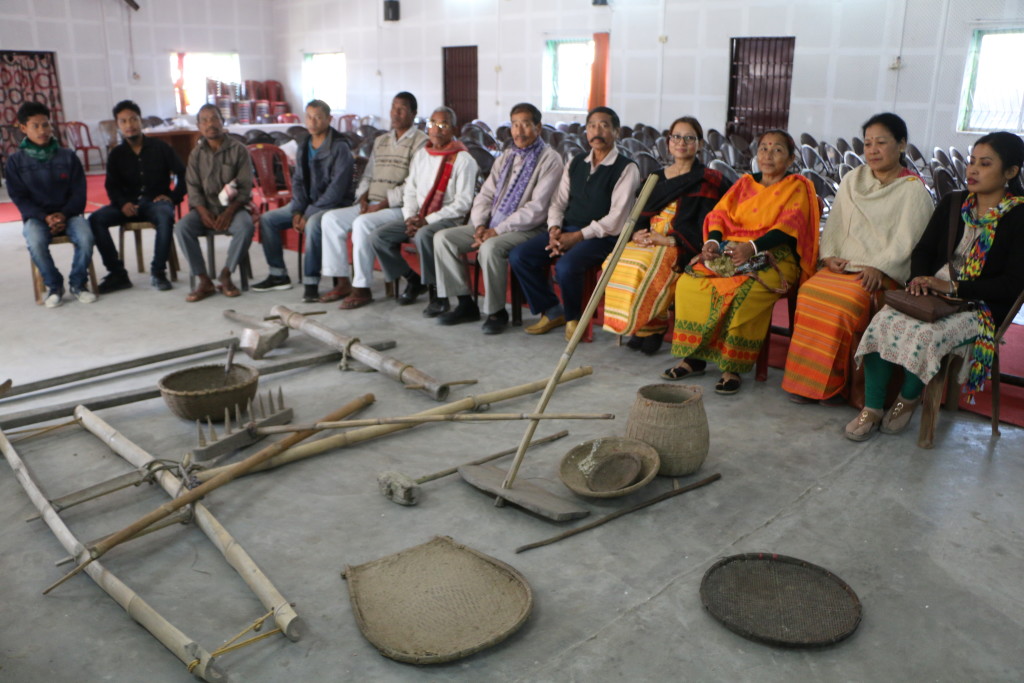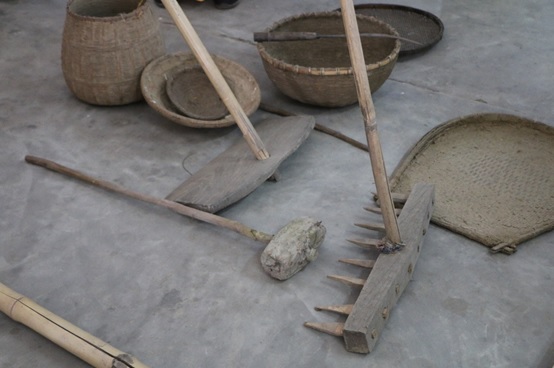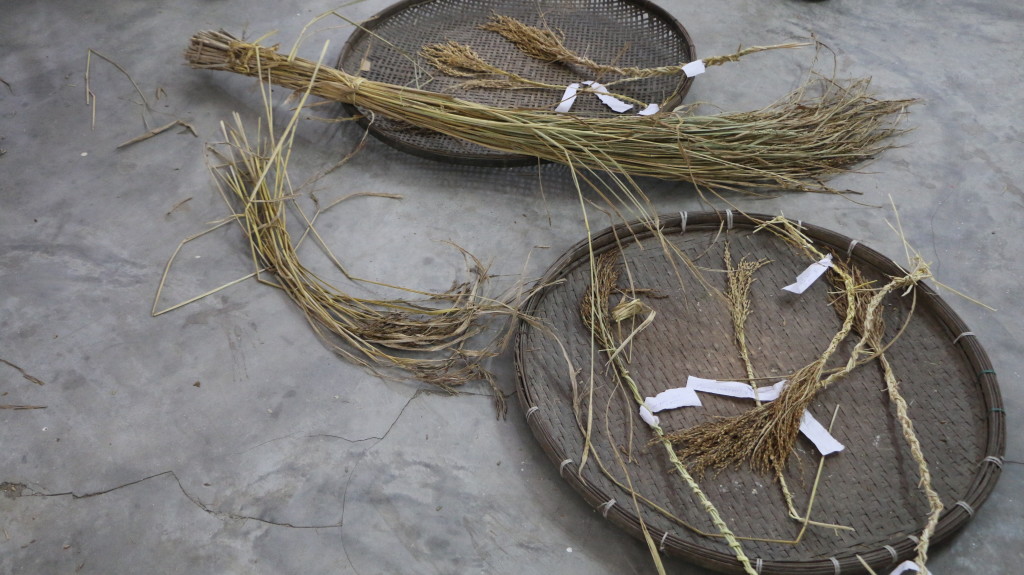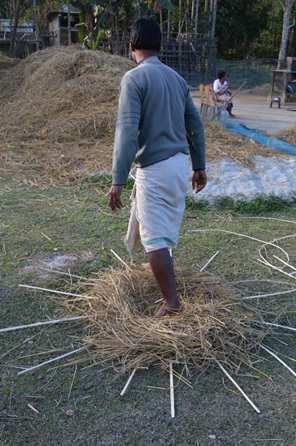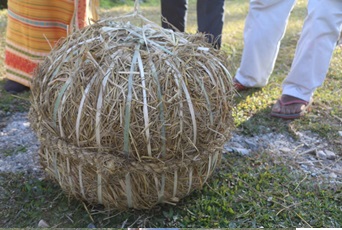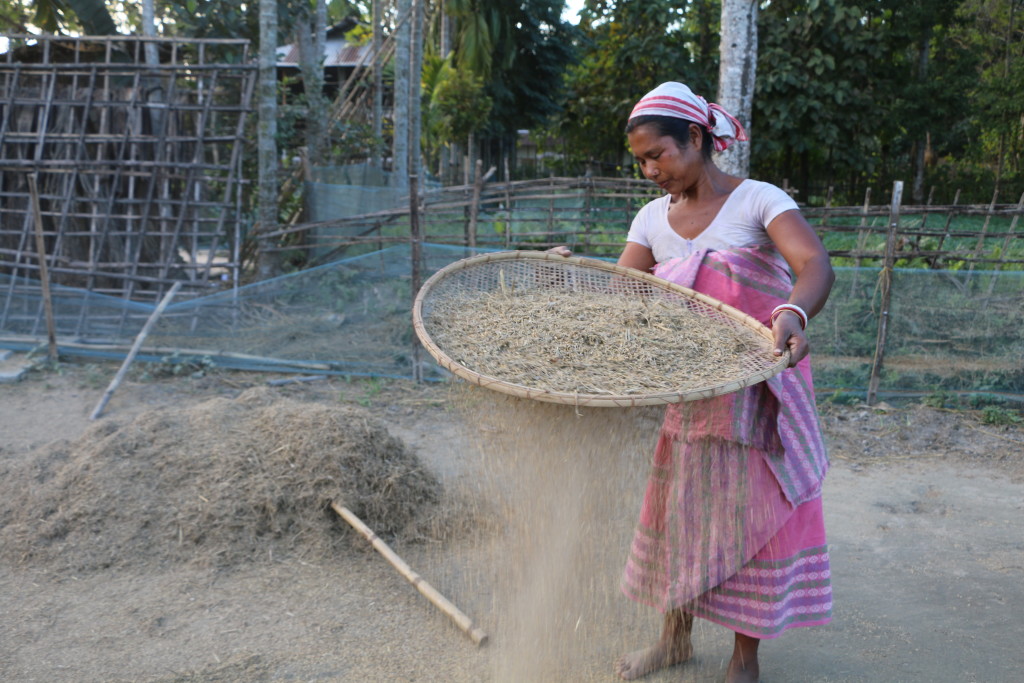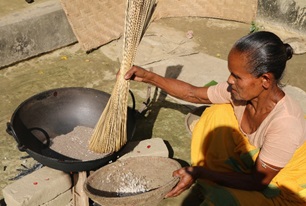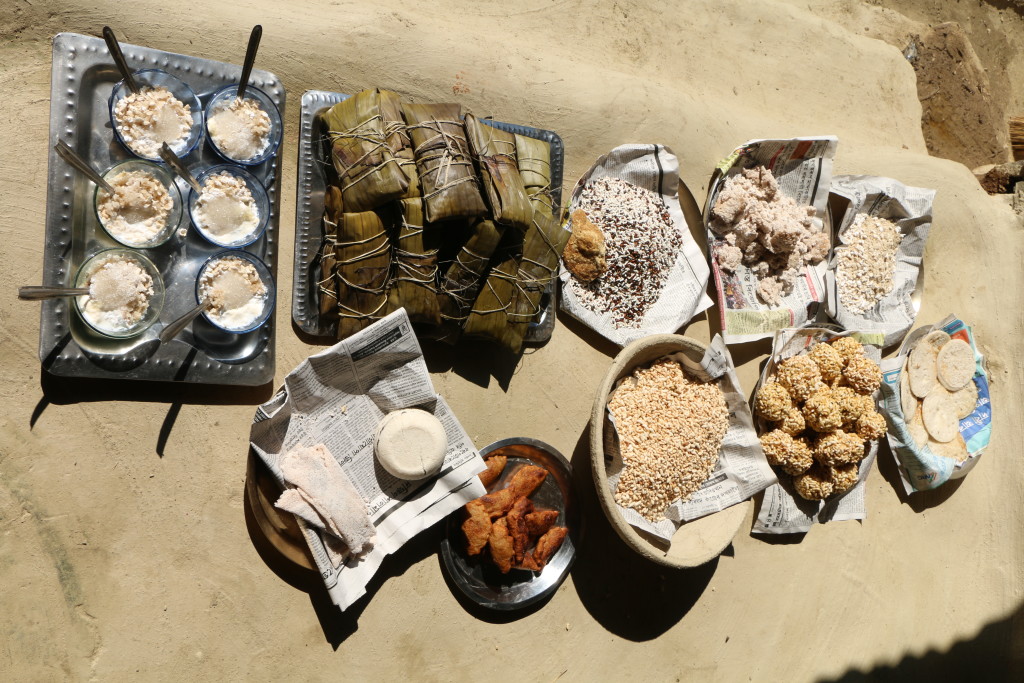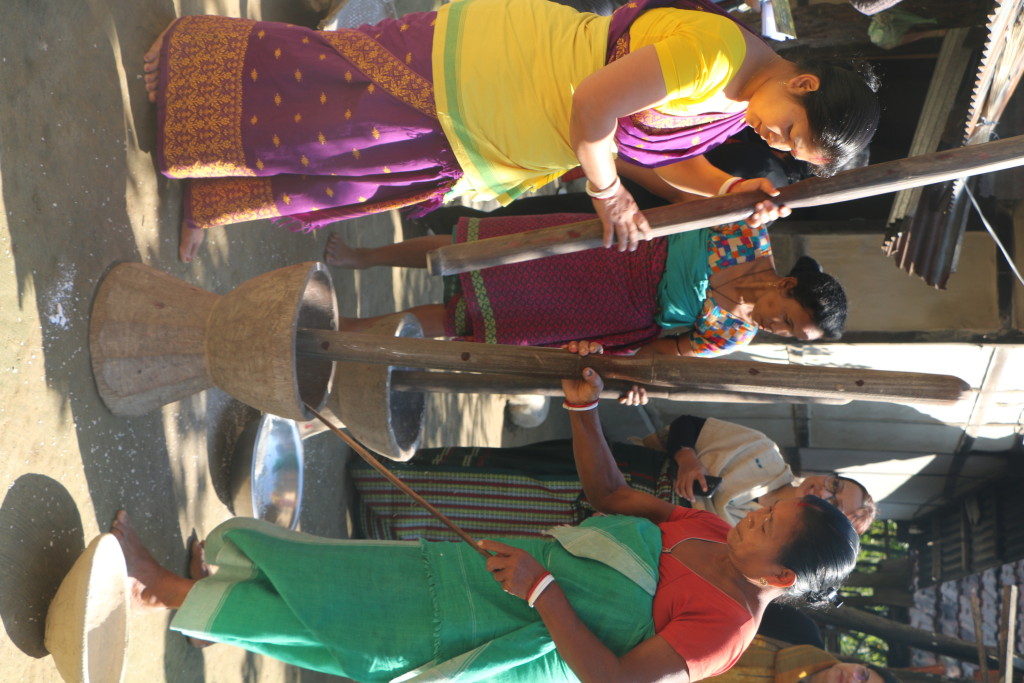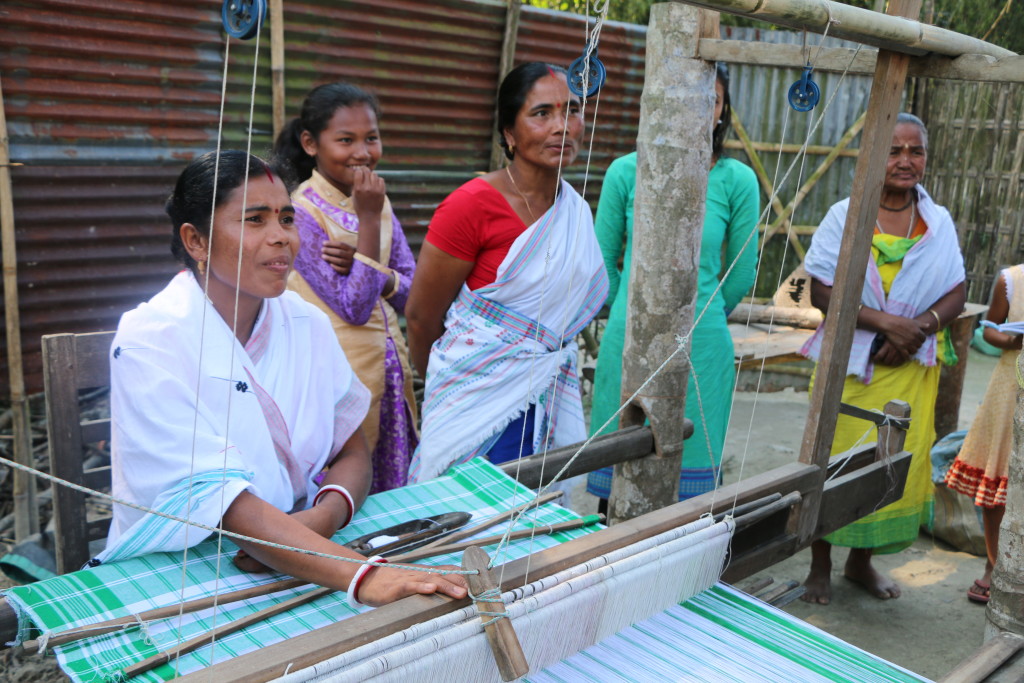An inter-community dialogue on Rice cultures and cultivation Back
Two Days Workshop on Rice Cultures at Kokrajhar, Assam
5-6 January 2019
Venue – Science College, Kokrajhar
An inter-community dialogue on Rice cultures and cultivation
A Two Day Workshop on Rice Cultures at Kokrajhar, Assam was organized on 5th-6th January 2019. This inter-community dialogue on Rice cultures and cultivation was a collaboration between Intangible Cultural Heritage division of INTACH, Ambedkar University Delhi and IIAS Leiden, to initiate a dialogue on the tradition and experience of growing rice, between 3 different communities of Kokrajhar District: Bodo, Rabha, and Rajbongshi.
Introduction
If you give me rice, I’ll eat today; If you teach me how to grow rice, I’ll eat every day.
~ Mahatma Gandhi
‘Rice as a food’ brings rice growing communities together, the complexity lies not just in the cultivation of rice, but also in the ways in which rice figures as a vehicle of shared meaning and self-identity creation.
The crucial role rice has played historically in building civilizations and in the formation of powerful states cannot be overlooked, even as the colonial perception of ‘rice as a food-crop’ continues to dominate the global narrative on rice.
With the influence of science and technology on agricultural practices, particularly in the western world, the importance of ‘rooted knowledge’ still prevalent among rice-growing communities across the world has gained new significance, calling for writing new histories focusing on cartographies of rice in a global context.
The Workshop was designed to allow dialogue between some of the prominent communities of Kokrajhar district: the Boro, Rabha, and Rasbongshi around rice.
The discussion highlighted the various aspects of rice culture, memory, ritual and the cultivation experience, ranging from knowledge about seeds, preservation of seeds, cross breeding varieties to farming methods, technology, tools, irrigation, sapling, (re)planting, and harvesting as well as challenges involved in growing rice the traditional way today.
1) The workshop aimed to help community members realize the significance of sharing knowledge about rice, and its relevance in distinctive cultural patterns.
2)Significantly, the workshop in Kokrajhar explored lesser-known aspects of the socio-cultural dynamics of rice cultivation in Assam and the relevance of an inter-community dialogue mediated by scholars and other local stakeholders in the field.
Resource persons and observers during the opening session
Day 1
Theme: Discussion and open discourse on the Material and Agricultural Implements
The first day of the workshop focused on the material artifacts of rice, their names in different dialects, specific and general uses, importance in traditional methods of rice cultivation and why some of the varieties have disappeared from the fields. Numerous agricultural tools like the Kula, Hasmi, Kasi, Nangoli, Daan Bola, Tokri and more were showcased and a live demonstration of how to use these tools was done.
Agricultural tools and implements used for rice cultivation
The detailed use and commonality of these across communities was discussed
The farmers also discussed the variety of rice seeds like Gopal Bhog which is a good variety to cure/reduce the risk of high blood pressure and diabetes, Kolam rice used for making Chidwa and Mudi, and the Mybra variety that is famous as sticky rice among other varieties. The free- flowing discussions also included local knowledge about seeds, methods of sowing, transplanting and preservation. The rich conversations opened up the new queries among the researchers and scholars.
Some of the varieties of rice that were exhibited
The second half session was conducted at the village site of Teetaguri where many innovative ways of winnowing and indigenous methods of seed preservation called Maijli, were demonstrated by Satyendra Brahma of the Boro community.
Making of Maijli used for seed storage and preservation
Winnowing technique demonstrated by Bodo Village women
Day 2
Theme: Cultural Expressions -Food, Performances, Songs and Rituals
The second day was started with a field visit to a Rajbhogshi village where the resource person Debeshwar Rai showcased the variety of food items/ cuisines which are usually prepared during the Bhogali Bihu, by the women of the Rajbongshi Community. Through this visit understanding the community engagement and collective organizational spirit of the village folk was evident.
Preparation of rice for making Pitha
Most importantly the aim of this site visit was to seethe ways in which rice plays a crucial role in the daily lives of the women in a rice farming household. Some of the rice preparations included Pithas(puyapitha, Dhaprapitha, chotipitha and Laaropitha), Seema Bhaath(Sticky Rice), varieties of Chida, Mola(Laddu made of puffed rice), Moodi and Akrai.
Food varieties prepared during the site visit
Preparation of food during the Bihu festival is a community activity where the women work together
The village women also showcased the traditional weaving practices
The concluding session in the second half of the day was an open discourse between the resource persons and the observers.This intense session included serious discussions on issues related to land, labour, cost of rice and cultivation methods. Various belief systems and folklores associated with rice, cultural expressions in the form of foods, performances, songs and rituals were discussed.
Conclusion:
The workshop served as a means of creating a dialogue between three important communities of Kokrajhar(Rabha, Bodo and Rajbongshi), where rice as a core factor was discussed in detail on how it connects these distinct identities. The collected cultural memories related to rice in terms of shared values, rituals and foods were audio -visually documented. This material would be sorted to develop an archive of rice cultures within India specifically looking at its associated intangible cultural heritage. The aim is to also develop a pan-India archive on rice which looks at the connections as well as distinct identities associated with rice cultures.
The workshop contributed to create a knowledge pool in understanding the sociology and cultural traits of rice. This is one way of using social memory to reflect on and record the importance of community knowledge for sustainable development. Besides this, it was also helpful to see the way rice creates space and even possibility of interdependence between different communities for sharing cultural values and also food security.




